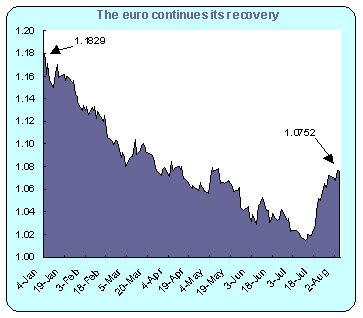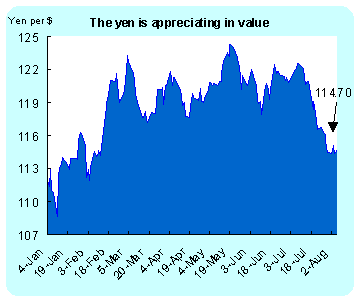|
International Perspective August 9, 1999
Anne D. Picker,
International Economist
Confidence grows in Europe
Analysts' expectations of volatile financial markets last week were fulfilled as overseas markets reacted to U.S. economic data. Stronger growth in Asia and Europe have led some investors to sell U.S. assets in favor of buying Japanese and euro-based assets to get in at the beginning of the new growth cycle.
Europe reinforces its growth pattern
Encouraging economic reports this past week supplied more evidence that the main euroland economies are on the mend. For example, the European Commission survey on business and consumer sentiment in the 11 euro nations reported that confidence rose for the first time since December 1998 (prior to the euro's introduction on January first). Other sentiment surveys underlined the upward drift in confidence in France and Germany. In France a survey of business leaders conducted by Insee (the French national statistics institute) showed expectations of increased demand in the third quarter.
German economic data reinforced other positive survey results. Manufacturing orders rose by more than analysts had forecast. An important component of the series - foreign orders - confirmed that exports were benefiting from recovering Asian demand. The impact of the euro's weakness during the past seven months (which makes export goods cheaper) is contributing to higher foreign demand. However, unemployment continued to rise for the fifth straight month in July, but is beginning to show signs of stabilizing. Given the perennial structural labor market problems it is premature to expect a turn around for some time to come.
Italian industrial production disappointed analysts and rose by a smaller than expected amount. Italy, the third largest euro nation, raised concern that its weakness may slow recovery in the region and sour investors.
Data from Britain was positive. The Bank of England's Monetary Policy Committee (MPC) met last week and left their key interest rate unchanged at 5 percent - a 22 year low. The rate is the same as in the United States but twice the 2.5 percent rate in euroland. The Bank of England has cut interest rates seven times since last October and the consensus forecast is that their next move will be up. However, analysts don't expect an increase soon since inflation (as measured by the retail price index excluding mortgages) is below the MPC's policy target rate of 2.5 percent. There is little sign that low unemployment and rising spending is pushing inflation up. A number of important British economic indicators will be released this week. - producer prices, retail sales, July unemployment and wage costs. They should give further indications of whether the economy remains on a solid course of accelerated growth.
Asia shows strength elsewhere besides Japan
Growth is beginning to blossom in many of the countries that suffered through the Asian financial crisis. The economies of South Korea, Thailand and Singapore have turned around despite ongoing problems and incomplete structural reforms. However, the political outlook in Indonesia remains uncertain. The regional economy is recovering more rapidly than forecast because it is responding to expansionary fiscal and monetary policies, low interest rates, currency stability, higher exports and a stock market rally that is reviving consumer spending.
Evidence continues to mount that worldwide growth is beginning to even out with Asia and Europe now contributing along with the United States.
Financial Markets
World Stock Exchanges
It has been a turbulent week for stock markets with prices falling around the world. By nature the markets are volatile, but a combination of circumstances made them even more volatile during the past week. Stronger than expected U.S. employment numbers combined with lower than expected productivity gains led the markets to conclude that U.S. interest rates will rise when the Federal Reserve Open Market Committee meets on August 24th. An increase in rates could have worldwide implications.
| Selected World Stock Market Indexes |
| Index | 6-Aug | 1999
High | 1999
Low | Week %
Change |
|---|
| Asia |
| Australia | All Ordinaries | 3007.00 | 3145.20 | 2804.80 | -0.43 |
| Japan | Nikkei 225 | 17084.24 | 18357.90 | 13232.70 | -4.35 |
| Hong Kong | Hang Seng | 13167.06 | 14506.74 | 9076.33 | -0.15 |
| S. Korea | Korea Composite | 938.26 | 1027.93 | 498.42 | -3.24 |
| Europe |
| Britain | FTSE 100 | 6121.00 | 6420.60 | 5770.20 | -1.78 |
| France | CAC |
4223.64 | 4697.80 | 3958.70 | -3.62 |
| Germany | XETRA DAX | 5010.47 | 5652.00 | 4668.50 | -1.79 |
| North America |
| United States | Dow | 10714.03 | 11209.80 | 9120.70 | 0.55 |
| Canada | TSE Composite 300 | 6878.80 | 7292.70 | 6180.30 | -2.85 |
| Mexico | Bolsa | 5029.66 | 7292.70 | 6180.30 | -4.38 |
Asian stock markets continued to lose ground on concerns over U.S. interest rates, the yen's strength against the dollar, ongoing Taiwan-China tensions and continuing political uncertainty in Indonesia.
In Japan, increasing skepticism about the Japanese recovery combined with ongoing concerns about overseas stock markets contributed to a disappointing week for the Nikkei, which closed 4.35 percent lower over the week. There was little domestic economic data for the markets to focus on. The stronger yen hurts Japan's export competitiveness and cuts into profits overseas when repatriated into yen.
In other Asian markets, the Hong Kong Heng Seng index dropped because of Sino-Taiwan tensions, continuing concern about a possible Chinese yuan devaluation and a likely rise in local interest rates. In Australia, the market reacted to loses in the Japanese and the Hong Kong markets.
The major European exchanges also finished the week lower because inflation fears - which intensified after the release of U.S. data - outweighed the otherwise good news for the domestic economies. On Friday, British, German, Italian, Belgian, Spanish and Swiss shares among others retreated on the news that U.S. employment jumped far more than forecast.
Currencies
The U.S. dollar continued to weaken on international currency markets because dealers are convinced that U.S. interest rates will rise soon. Dealers believe that the European and Japanese economies are now on the mend while inflation is becoming a real threat in the United States. However, the real threat for the dollar is not that foreigners will stop buying U.S. assets, but that Americans who have kept their money at home will begin buying foreign assets again. This will lower the dollar's value against foreign currencies. The dollar lost about 7 percent of its value against the yen and 5.5 percent against the euro in the past month as investors sold U.S. equities and redirected capital overseas.
Euro
Evidence of stronger growth in Germany, which accounts for about a third of the euro area's output has been driving the value of the euro up since July 13, when it reached its lowest level against the U.S. dollar. The euro has rallied along with the more optimistic outlook for the eurozone. Increasing business confidence in major European countries that are members of the single currency has boosted the euro.

A study using the UK Treasury's economic model concluded that the pound would have to fall by more than 20 per cent for the UK to make a painless entry into European monetary union. Once the UK has signed up for the euro, an overvalued exchange rate can only be corrected by holding inflation lower than elsewhere. But because British companies are slow to change prices and wages, the result is likely to be a painful adjustment.
Yen
Japan is worried that the continuing rise in the value of the yen will undermine its budding economic recovery. The Japanese spent an estimated $30 billion in the last two months to keep the yen at about 120 to the dollar - a level at which their export firms make healthy profits. The yen is currently at 114.70 to the dollar, which is above the Finance Ministry's comfort zone. Intervention failed analysts say, because investors are fearful of the consequences of higher inflation in the United States. Market participants think that Japanese authorities are reluctant to intervene again as long as the appreciation in the yen (less yen per dollar) continues to be driven by non-speculative flows.

Why U.S. investors care...
With continuing good news from Europe and Asia, investors should find many investment opportunities to take advantage of in the expanding economies, especially in Europe.
Looking Ahead
The following indicators will be released this week.
| Europe | | |
| August 9 | UK | Producer Price Index (July) |
| August 10 | Germany | Trade Balance and Current Account (June) |
| August 11 | France | Consumer Price Index (July) |
| Germany | Industrial Production (June) |
| Germany | Consumer Price Index (July) |
| UK | Labor Market (July) |
| UK | Bank of England inflation report released |
| August 13 | Germany | Retail Sales (June) |
| EU | Industrial Producer Prices (June) |
| Asia | | |
| August 9 | Japan | Wholesale Prices (July) |
| Japan | Import/Export Prices (July) |
| August 10 | Japan | Current Account (June) |
| August 13 | Japan | Bank of Japan Monetary Policy Committee Meeting |
| Japan | Gross Domestic Product (Q1,99) |
Release dates are subject to change.
For U.S. data releases, see this week's Simply Economics.
|



